一般过去时一般现在时对比
- 格式:ppt
- 大小:46.50 KB
- 文档页数:11
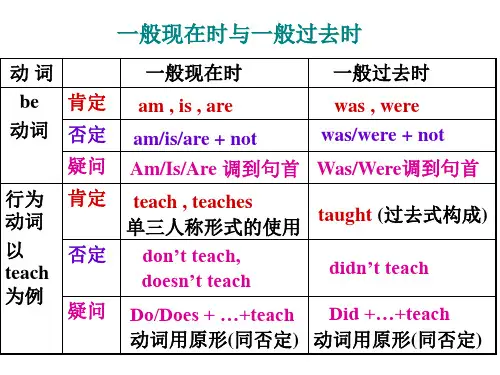
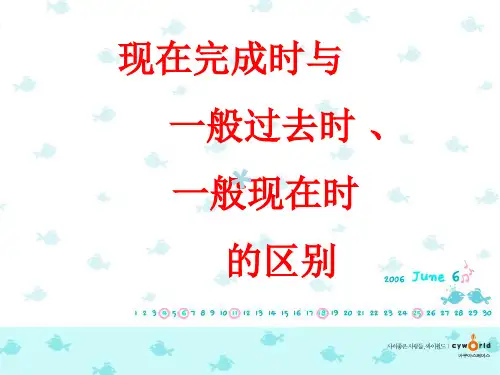
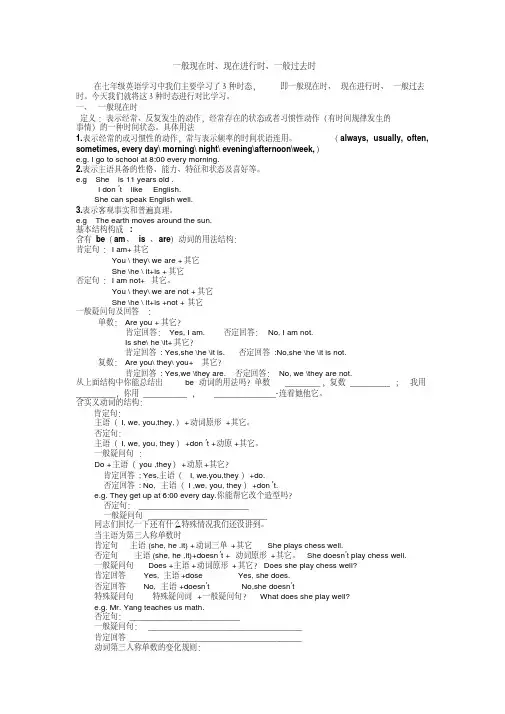
一般现在时、现在进行时、一般过去时在七年级英语学习中我们主要学习了3种时态,即一般现在时、现在进行时、一般过去时。
今天我们就将这3种时态进行对比学习。
一、一般现在时定义:表示经常、反复发生的动作,经常存在的状态或者习惯性动作(有时间规律发生的事情)的一种时间状态。
具体用法1.表示经常的或习惯性的动作,常与表示频率的时间状语连用。
(always, usually, often, sometimes, every day\ morning\ night\ evening\afternoon\week,)e.g. I go to school at 8:00 every morning.2.表示主语具备的性格、能力、特征和状态及喜好等。
e.g She is 11 years old .I don’t like English.She can speak English well.3.表示客观事实和普遍真理。
e.g The earth moves around the sun.基本结构构成:含有be(am、is 、are)动词的用法结构:肯定句:I am+其它You \ they\ we are +其它She \he \ it+is +其它否定句:I am not+ 其它。
You \ they\ we are not +其它She \he \ it+is +not +其它一般疑问句及回答:单数:Are you +其它?肯定回答:Yes, I am. 否定回答:No, I am not.Is she\ he \it+其它?肯定回答: Yes,she \he \it is. 否定回答:No,she \he \it is not.复数:Are you\ they\ you+ 其它?肯定回答: Yes,we \they are. 否定回答:No, we \they are not.从上面结构中你能总结出be动词的用法吗?单数________,复数_________ ;我用_________,你用__________ ,______________-连着她他它。
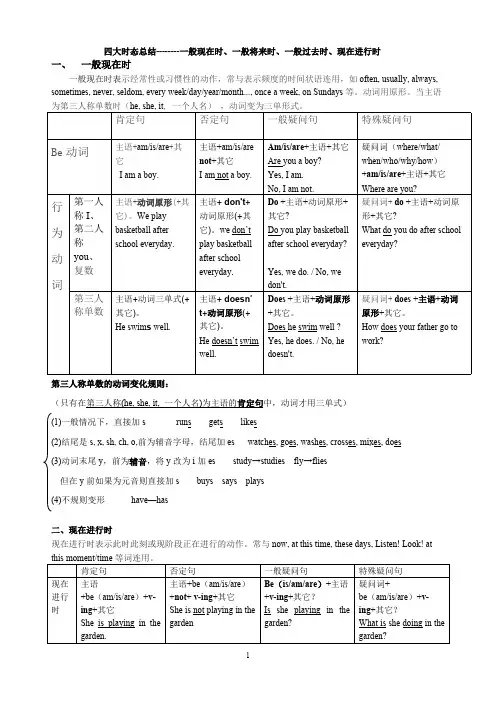
四大时态总结--------一般现在时、一般将来时、一般过去时、现在进行时一、一般现在时一般现在时表示经常性或习惯性的动作,常与表示频度的时间状语连用,如often, usually, always, sometimes, never, seldom, every week/day/year/month..., once a week, on Sundays等。
动词用原形。
当主语为第三人称单数时(he, she, it, 一个人名),动词变为三单形式。
肯定句否定句一般疑问句特殊疑问句Be动词主语+am/is/are+其它I am a boy.主语+am/is/arenot+其它I am not a boy.Am/is/are+主语+其它Are you a boy?Yes, I am.No, I am not.疑问词(where/what/when/who/why/how)+am/is/are+主语+其它Where are you?第一人称I、第二人称you、复数主语+动词原形(+其它)。
We playbasketball afterschool everyday.主语+ don't+动词原形(+其它)。
we don’tplay basketballafter schooleveryday.Do +主语+动词原形+其它?Do you play basketballafter school everyday?Yes, we do. / No, wedon't.疑问词+do +主语+动词原形+其它?What do you do after schooleveryday?行为动词第三人称单数主语+动词三单式(+其它)。
He swim s well.主语+ doesn’t+动词原形(+其它)。
He doesn’t swimwell.Does +主语+动词原形+其它。
Does he swim well ?Yes, he does. / No, hedoesn't.疑问词+ does +主语+动词原形+其它。
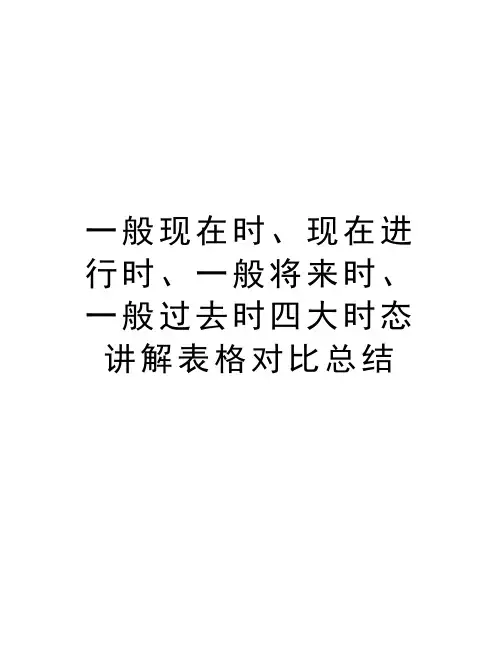
一般现在时、现在进行时、一般将来时、一般过去时四大时态讲解表格对比总结四大时态总结--------一般现在时、一般将来时、一般过去时、现在进行时一、一般现在时一般现在时表示经常性或习惯性的动作,常与表示频度的时间状语连用,如often, usually, always, sometimes, never, seldom, every week/day/year/month..., once a week, on Sundays等。
动词用原形。
当主语第三人称单数的动词变化规则:(只有在第三人称(he, she, it, 一个人名)为主语的肯定句中,动词才用三单式)(1)一般情况下,直接加s runs gets likes(2)结尾是s, x, sh, ch, o,前为辅音字母,结尾加es watches, goes, washes, crosses, mixes, does(3)动词末尾y,前为辅音,将y改为i加es study→studies fly→flies但在y前如果为元音则直接加s buys says plays(4)不规则变形 have—has二、现在进行时现在进行时表示此时此刻或现阶段正在进行的动作。
常与now, at this time, these days, Listen! Look! at(1)直接在动词后加ing. going, starting, working.(2)去掉词尾不发音的e,再加ing. leave--leaving, make---making.注意:如果单词结尾的e发音,则不能去掉,也直接加ing. see –seeing agree - agreeing .(3) 对于动词只有一个元音,而其后跟了一个辅音字母时,双写末尾辅音字母再加ing.sitting, beginning run – running stop – stopping cut – cutting control – controlling(4)以ie结尾,把ie变y再加ing。
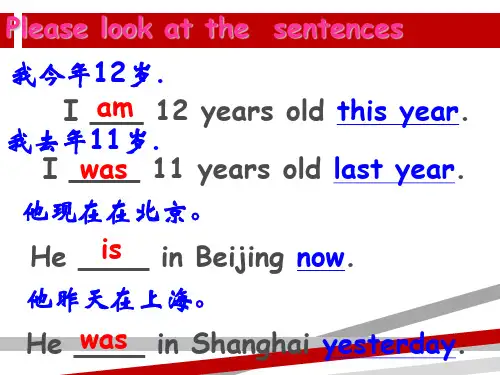
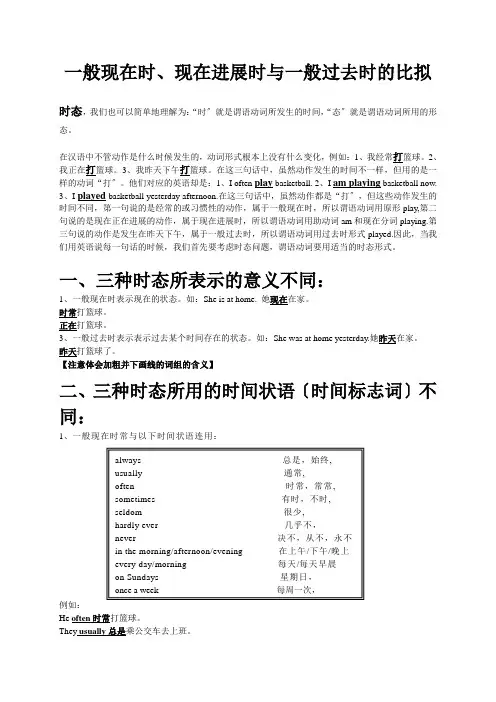
一般现在时、现在进展时与一般过去时的比拟时态,我们也可以简单地理解为:“时〞就是谓语动词所发生的时间,“态〞就是谓语动词所用的形态。
在汉语中不管动作是什么时候发生的,动词形式根本上没有什么变化,例如:1、我经常打篮球。
2、我正在打篮球。
3、我昨天下午打篮球。
在这三句话中,虽然动作发生的时间不一样,但用的是一样的动词“打〞。
他们对应的英语却是:1、I often play basketball. 2、I am playing basketball now.3、I played basketball yesterday afternoon.在这三句话中,虽然动作都是“打〞,但这些动作发生的时间不同,第一句说的是经常的或习惯性的动作,属于一般现在时,所以谓语动词用原形play,第二句说的是现在正在进展的动作,属于现在进展时,所以谓语动词用助动词am和现在分词playing.第三句说的动作是发生在昨天下午,属于一般过去时,所以谓语动词用过去时形式played.因此,当我们用英语说每一句话的时候,我们首先要考虑时态问题,谓语动词要用适当的时态形式。
一、三种时态所表示的意义不同:1、一般现在时表示现在的状态。
如:She is at home. 她现在在家。
时常打篮球。
正在打篮球。
3、一般过去时表示表示过去某个时间存在的状态。
如:She was at home yesterday.她昨天在家。
昨天打篮球了。
【注意体会加粗并下画线的词组的含义】二、三种时态所用的时间状语〔时间标志词〕不同:1、一般现在时常与以下时间状语连用:always 总是,始终,usually 通常,often 时常,常常,sometimes 有时,不时,seldom 很少,hardly ever 几乎不,never 决不,从不,永不in the morning/afternoon/evening 在上午/下午/晚上every day/morning 每天/每天早晨on Sundays 星期日,once a week 每周一次,例如:He often时常打篮球。
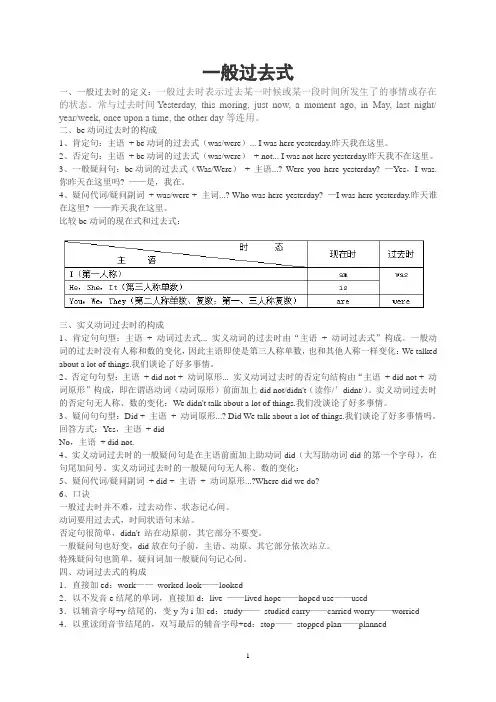
一般过去式一、一般过去时的定义:一般过去时表示过去某一时候或某一段时间所发生了的事情或存在的状态。
常与过去时间Yesterday, this moring, just now, a moment ago, in May, last night/ year/week, once upon a time, the other day等连用。
二、be动词过去时的构成1、肯定句:主语+ be动词的过去式(was/were)... I was here yesterday.昨天我在这里。
2、否定句:主语+ be动词的过去式(was/were)+ not... I was not here yesterday.昨天我不在这里。
3、一般疑问句:be动词的过去式(Was/Were)+ 主语...? Were you here yesterday? —Yes,I was.你昨天在这里吗? ——是,我在。
4、疑问代词/疑问副词+ was/were + 主词...? Who was here yesterday? —I was here yesterday.昨天谁在这里? ——昨天我在这里。
比较be动词的现在式和过去式:三、实义动词过去时的构成1、肯定句句型:主语+ 动词过去式... 实义动词的过去时由“主语+ 动词过去式”构成。
一般动词的过去时没有人称和数的变化,因此主语即使是第三人称单数,也和其他人称一样变化:We talked about a lot of things.我们谈论了好多事情。
2、否定句句型:主语+ did not + 动词原形... 实义动词过去时的否定句结构由“主语+ did not + 动词原形”构成,即在谓语动词(动词原形)前面加上did not/didn't(读作/′didnt/)。
实义动词过去时的否定句无人称、数的变化:We didn't talk about a lot of things.我们没谈论了好多事情。
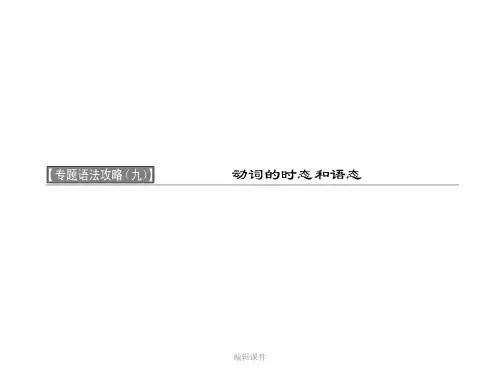
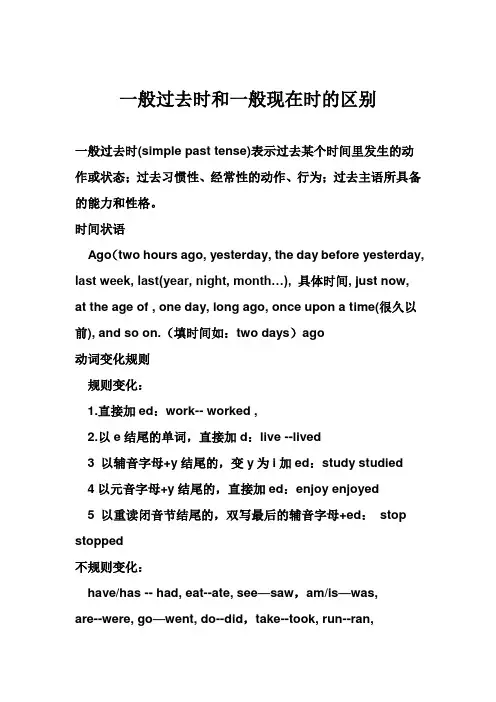
一般过去时和一般现在时的区别一般过去时(simple past tense)表示过去某个时间里发生的动作或状态;过去习惯性、经常性的动作、行为;过去主语所具备的能力和性格。
时间状语Ago(two hours ago, yesterday, the day before yesterday, last week, last(year, night, month…), 具体时间, just now,at the age of , one day, long ago, once upon a time(很久以前), and so on.(填时间如:two days)ago动词变化规则规则变化:1.直接加ed:work-- worked ,2.以e结尾的单词,直接加d:live --lived3 以辅音字母+y结尾的,变y为i加ed:study studied4以元音字母+y结尾的,直接加ed:enjoy enjoyed5 以重读闭音节结尾的,双写最后的辅音字母+ed:stop stopped不规则变化:have/has -- had, eat--ate, see—saw,am/is—was,are--were, go—went, do--did,take--took, run--ran,lend--lent, sleep--slept, get—got, meet—met, bring—brought, buy—bought, think—thought, say—said, give—gave, put—put, write--wrote, swim--swam基本结构主语+动词过去式+其他否定形式①was/were+not;②在行为动词前加didn't,同时还原行为动词一般疑问句Did+主语+do+其他?例句She often came to help us in those days.I didn't know you were so busy.一般现在时:表示经常发生的动作或存在的状态,一般情况下在动词后加“s”或“es”。
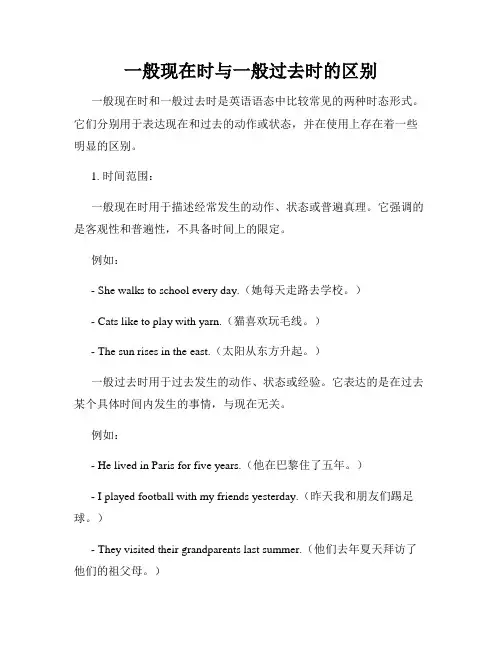
一般现在时与一般过去时的区别一般现在时和一般过去时是英语语态中比较常见的两种时态形式。
它们分别用于表达现在和过去的动作或状态,并在使用上存在着一些明显的区别。
1. 时间范围:一般现在时用于描述经常发生的动作、状态或普遍真理。
它强调的是客观性和普遍性,不具备时间上的限定。
例如:- She walks to school every day.(她每天走路去学校。
)- Cats like to play with yarn.(猫喜欢玩毛线。
)- The sun rises in the east.(太阳从东方升起。
)一般过去时用于过去发生的动作、状态或经验。
它表达的是在过去某个具体时间内发生的事情,与现在无关。
例如:- He lived in Paris for five years.(他在巴黎住了五年。
)- I played football with my friends yesterday.(昨天我和朋友们踢足球。
)- They visited their grandparents last summer.(他们去年夏天拜访了他们的祖父母。
)2. 动词形式:在一般现在时中,大多数动词使用原形;第三人称单数使用动词的第三人称单数形式(在动词后加-s/-es)。
例如:- I watch TV every evening.(我每天晚上看电视。
)- She often reads books in her free time.(她经常在空闲时间看书。
)在一般过去时中,大多数动词使用过去式形式来表示过去发生的动作或状态。
例如:- I watched a movie last night.(昨晚我看了一部电影。
)- He cooked dinner for his family yesterday.(昨天他给家人做了晚餐。
)3. 表示方式:一般现在时用于陈述客观事实或经常性动作,表达一种普遍真理。
例如:- Water boils at 100 degrees Celsius.(水在100摄氏度时沸腾。
一般现在时、一般过去时与一般将来时的对比一、时态总结三.用动词的正确形式填空.1.I ______________ (be not) a middle school student. 2.Sam and I______________ (be) in different classes .3. ______________ you ______________ (have) a new watch?4. She______________ (make) a call to her parents once a week.5. It’s nine o’clock. It's time ______________ (play) games.6. I want ______________ (take) some books to the classroom.7. It's snowing now. We can go out and ______________ (play) in the snow.8. The men ______________ (work) near the house now.9. Look! The teachers ______________ (talk) to the students.10. It is true that the sun (rise) in the east and (fall) down in the west.11. I ______________ (leave) my jacket at your home just now.12. He______________ (be) born in 1982.13. Where ______________ your brother______________ (come) from?14. Bill ______________ (stay) at home every Sunday.15. I can ______________ (help) you to ______________ (carry) the things.16. Where ______________ you ______________ (go) tomorrow?17. Mike often______________ (read) English in the morning.He ______________ (like) ______________ (read) very much.18. ______________ they ______________ (speak) Japanese? Yes, they do.19. ______________ you ______________ (have) a good time at the cinema last night?20. There______________ (be) a meeting next week.21. Listen! Who ______________ (sing) next room?22. My father ______________ ( work) in the factory three years ago.23. He ______________ (not be) at school yesterday because he ______________ (be) ill.24. ______________ (be) there any water in the glass?25. He with his friends usually ______________ (play) football after school.四、根据首字母提示或所给中文完成下列句子:1.Don’t ______________ (打开) the door. It’s very cold.2.What are you ______________ (写), Betty?3.Guangzhou is one of the most modern(现代的) and beautiful ____________(城市) in China.4.__________ (课) Three is very hard. You must listen to the teacher _____________ (认真).5.They’re ______________ (来自) England.6.Tom is from______________ (美国) and he’s ______________ (美国人).7.What’s Jack’s ___________ _____________(姓)?8.Peter can talk a_____________ jobs in English.9.Sam and Betty b_____________ speak English.10.Linda can play basketball and r____________ a bike.11.My _____________(父母) take me to (拜访) my uncle every year.12.The tall _______________(建筑物) over there is the gym.13.Please ________________(欢迎) Betty and Tony to our school.14.My father is a teacher at Beijing ________________(国际的) school.五.用下面所给词的正确形式完成下列句子:be there behind dictionary some there bee-mail have got in one’s family make there be1. Are there __________________ maps on the wall in your classroom?2. _______________ many books in our school library.3. ________________ an English book on the teacher’s desk?4. The gym is ___________ the offices.5. Are there any __________________ in your bookshop?6. ___________________ any juice in the bottle?7. Here are some ______________ for you.8. Bill _________________ a small family.9. She has got eight people __________________.10. It’s eleven o’clock now. They ______________ kites. They’re going to fly kites next Saturday.六.阅读短文,从各题所给的A、B、C和D四个选项中,选出可以填入空白处的最佳答案。
一般现在时、现在进行时与一般过去时的比较时态,我们也可以简单地理解为:“时”就是谓语动词所发生的时间,“态”就是谓语动词所用的形态。
在汉语中不管动作是什么时候发生的,动词形式基本上没有什么变化,例如:1、我经常打篮球。
2、我正在打篮球。
3、我昨天下午打篮球。
在这三句话中,虽然动作发生的时间不相同,但用的是相同的动词“打”。
他们对应的英语却是:1、I often play basketball. 2、I am playing basketball now. 3、I played basketball yesterday afternoon.在这三句话中,虽然动作都是“打”,但这些动作发生的时间不同,第一句说的是经常的或习惯性的动作,属于一般现在时,所以谓语动词用原形play,第二句说的是现在正在进行的动作,属于现在进行时,所以谓语动词用助动词am和现在分词playing.第三句说的动作是发生在昨天下午,属于一般过去时,所以谓语动词用过去时形式played.因此,当我们用英语说每一句话的时候,我们首先要考虑时态问题,谓语动词要用适当的时态形式。
一、三种时态所表示的意义不同:1、一般现在时表示现在的状态。
如:She is at home. 她现在在家。
一般现在时也表示经常的或习惯性的动作。
如:He often plays basketball.他时常打篮球。
2、现在进行时表示现在进行时表示现在(说话瞬间)正在进行或发生的动作。
如:He is playing basketball now.他正在打篮球。
3、一般过去时表示表示过去某个时间存在的状态。
如:She was at home yesterday.她昨天在家。
一般过去时也表示过去某个时间发生的动作。
如:He played basketball yesterday.他昨天打篮球了。
【注意体会加粗并下画线的词组的含义】二、三种时态所用的时间状语(时间标志词)不同:1、一般现在时常与以下时间状语连用:always 总是,始终,usually 通常,often 时常,常常,sometimes 有时,不时,seldom 很少,hardly ever 几乎不,never 决不,从不,永不in the morning/afternoon/evening 在上午/下午/晚上every day/morning 每天/每天早晨on Sundays 星期日,once a week 每周一次,例如:He often plays basketball. 他时常打篮球。
四大时态总结--------一般现在时、一般将来时、一般过去时、现在进行时一、一般现在时一般现在时表示经常性或习惯性的动作,常与表示频度的时间状语连用,如often, usually, always, sometimes, never, seldom, every week/day/year/month..., once a week, on Sundays等。
动词用原形。
当主语第三人称单数的动词变化规则:(只有在第三人称(he, she, it, 一个人名)为主语的肯定句中,动词才用三单式)(1)一般情况下,直接加s runs gets likes(2)结尾是s, x, sh, ch, o,前为辅音字母,结尾加es watches, goes, washes, crosses, mixes, does(3)动词末尾y,前为辅音,将y改为i加es study→studies fly→flies但在y前如果为元音则直接加s buys says plays(4)不规则变形have—has二、现在进行时现在进行时表示此时此刻或现阶段正在进行的动作。
常与now, at this time, these days, Listen! Look! at this动词加ing规则(1)直接在动词后加ing. going, starting, working.(2)去掉词尾不发音的e,再加ing. leave--leaving, make---making.注意:如果单词结尾的e发音,则不能去掉,也直接加ing. see –seeing agree - agreeing .(3) 对于动词只有一个元音,而其后跟了一个辅音字母时,双写末尾辅音字母再加ing.sitting, beginning run – running stop – stopping cut – cutting control – controlling(4)以ie结尾,把ie变y再加ing。
一、一般过去时与一般现在时定义及结构的区分1)概念一般过去时:过去发生的动作或是状态a. 表示过去某个时间里发生的动作或状态;b. 过去习惯性、经常性的动作、行为;c. 过去主语所具备的能力和性格..一般现在时:现在通常性、规律性、习惯性的动作或是状态a. 表示经常发生的动作;是一般情况不是具体的某一件事;b. 长期存在的一种状态;c. 永恒的事实或真理;谚语等..2基本构成A.谓语动词是实义动词时的结构:一般过去时:肯定句:主语+动词过去式+其他否定句:主语+did+not+动词+其他疑问句:Did+主语+动词+其他特殊疑问句:特殊疑问词+did+主语+动词+其他否定疑问句:Did+主语+not+动词+其他一般现在时:肯定句:主语+动词或动词+s+其他否定句:主语+do/does+not+动词+其他疑问句:Do/Does+主语+动词+其他特殊疑问句:特殊疑问词+do/does+主语+动词+其他否定疑问句:Do/Does+主语+not+动词+其他注:变化最大的在于:do/does→did 过去式的动词变化B. 谓语动词是助动词时:a. Be 动词一般过去时:肯定句:主语+was were +表语否定句:主语+was were +not+表语疑问句:Was Were +主语+表语特殊疑问句:特殊疑问词+was were +主语+表语否定疑问句:Was Were +主语+not+表语一般现在时:肯定句:主语+be动词+表语否定句:主语+be动词+not+表语疑问句:Be动词+主语+表语特殊疑问句:特殊疑问词+be动词+主语+表语否定疑问句:Be动词+主语+not+表语注意:amI、ishe/she/it→wasArewe/you/they→were第三人称时;动词要进行变化..注意:不管是过去时还是现在时;疑问句都需要助动词did或do.c.情态动词过去式:一般过去时:将情态动词变成过去式;后面加原形;其他句型转变的规则与be动词基本一致..shall― will― can—may― must―have to―例:I can swim.肯定句:否定句:疑问句:3怎样从时间状语上判断一般现在时和一般过去时一般过去时:yesterday morning;afternoon;evening ;the day before yesterday ;last night week;Sunday;weekend;month;winter;year;century 世纪;ago ;this morning/afternoon/eveningjust now ;the other day -- a few days ago;at the age of 10 过去年龄段;in the old days一般现在时:always;usually;;every morning/night/evening/day/week;often;sometimes; twice a week; ; seldom; once a month; ever; never4一般过去时与一般现在时动词的变化规则:一般过去时:A. 规则动词过去式的构成有四条规则:①一般在动词原形末尾直接加上-ed..如:look-looked..②以不发音的字母e结尾的动词;去e再加-ed..如:live-lived..③末尾只有一个辅音字母的重读闭音节;先双写这个辅音字母;再加-ed..如:stop-stopped..④末尾是辅音字母+y结尾的动词;先变y为i;然后再加-ed..如:study-studied..B. 不规则动词的过去式需特殊记忆..如:amis-was; are-were; go-went;come-came; take-took; have has-had等..注: 课本后面都有不规则动词的变化;需熟记..一般现在时:a.一般情况下;加-s;b. 以s; sh; ch; x;o等结尾的词; 加–es;c. 以辅音字母+y结尾的词; 变y 为i再加es.课堂练习一、写出下列动词的三单形式和过去式三单过去式三单过去式三单过去式三单过去buy _______ _______ fly _____ _______ plant ______ _______ study ______ drink _____ ______ play_____ _______ go ______ _______ make ______ do _______ ______ dance ______ ______ worry ______ _______ ask _______ taste _____ ______ eat ___ ___ ___ __ read ______ _ _ put ________ let ______ ______ run _______ _______ keep _____ _______ have ______ find _____ ______ get ___ ___ ___ _ eat ______ ___ ___ ring _______ write_____ _______ sleep _______ _______ give _____ _______ stop ______二. 用正确的动词形式填空1. The children ___________ run everyday.2. -I ________ up at half past six this morning. get-My father always __________come back from work very late.3. My mother ____________ a lot of fruit yesterday afternoon . buy4. They ________ _________ a meeting yesterday. not have5. - ______ you _________ have any color pens -Sorry; I don’t have any.6. She likes eggs; but she __________________ not like bread.7. My mother tell me a story every night.8. –How much meat ________ you ___________ want - A kilo;please.9. Someone __________ be in the next room.10. There __________ be a pen and two erasers in the pencil- box.11. You must _________ get here at two this afternoon.12. The twins _________ thirteen two years ago. be13. We must __________ help the teacher carry it.14. Who __________ teach you English in your school15. The teacher is busy. He only __________ sleep five hours a day.16. Near our school there _________ be a shop; it _________ sell a lot ofbooks.17. What _______ he _________ like18. He __________ teach English in a middle school.19. You always do your homework well.20. He can ___________ sing this song.21. Let’s ___________ help my mother ___________ cook.22. I think Li Lei must ______________ be at school.23. There __________ be some bread and meat on the table.24. Lily __________ be a Young Pioneer.三. 句型转换1.They came to China in 1990.变一般疑问句__________ they ________ to China in 19902She washed the clothes last Sunday. 变否定句She _________ ________ the clothes last Sunday.3.My mother likes her students. 变一般疑问句_______________________________________4.. Do you watch TV on Sunday 用last Sunday 改写成过去时态的句子______________________________________________5.Wei Hua bought a new pen yesterday. 变否定句She ________ ________ a new pen yesterday.6. We had a meeting the day before yesterday. 变一般疑问句_______ you _______ a meeting the day before yesterday7. They had a good time last Sunday.________ ________ the twins _______ a good time8. There were some cars in front of the house just now.否定句:There _______ ________ cars in front of the house just now.一般疑问句:______ there _____ cars in front of the house just now9. He went to the zoo with his father yesterday.否定句:He ________ _______ to the zoo with his father yesterday.一般疑问句:______ he ______ to the zoo with his father yesterday特殊疑问句:he yesterday10. Mary usually plays games with her grandparents.否定句:Mary usually _______ ________ games with her grandparents. 一般疑问句:______ Mary usually ________ games with her grandparents 特殊疑问句:Mary usually11. Mary does her homework well.否定句:Mary her homework well.一般疑问句:Mary her homework well一、作业布置一.填空1 They____ be on the farm a moment ago.2 There____ be a shop not long ago.3 Jenny____not goto bed until 11:00 o'clock last night.4 Danny _____read English five minutes ago.5 I _____seeLi Lei ____go out just now.6 He ____dohis homework every day. But he __not doit yesterday.7 When I was young; I _____playgames with my friends.8 When ____you_____writethis book I _____it last year.9 Did he____have lunch at home11.There __________ be some bread and meat on the table.13.Liu Ying _______________ study in Beijing these days.14.They _____________________ clean the floor now.15.Han Meimei often ____________ play games after school.16.The day before yesterday they _____ ___ watch a volleyball match. 二改错1. Does he enjoys listening to music2. Mary’s mother was ill yesterday. She has to stay at home to look after her.3. My teacher was angry because I am late.4. The boy has a party at home now.5. I were went to the library with my friends two hours ago.6. He spends much time reading book last weekend.7. Linda can helps his mother clean the room.8. I buyed a large bag of milk in the supermarket.9. Someone are looking at you.10. I am go fishing now.。
一般现在时和一般过去时的区别对英语动词“时”的理解:在英语中,“时”(TENSE)是有关动词的一个语法范畴,它是表示时间区别的动词形式。
英语动词有两个“时”,即现在时(Present Tense)和过去时(Past Tense)。
一般现在时:现在时是主要表示现在时间的动词形式。
一般现在时(Simple Present)指的是未与进行体或完成体相结合的现在时动词形式。
一般现在时动词的使用规则:一般现在时通常是以动词原形表示的,但在主语为第三人称单数时,动词词尾要加-s或-es。
规则如下:1)当动词是以-s(-ss),sh,ch,x,o结尾时,加-es。
如:kiss—kisses wash—washes teach—teaches box(把……装箱)—boxes go—goes2) 当动词是以“辅音字母+y”结尾时,改y为i再加-es。
如:carry—carries fly—flies try—tries study—studies3)动词be的一般现在时表现形式是:am,is,are,根据人称和数的不同而分别采用。
4)have的第三人称单数形式为has。
5)除上述情况外,其余动词在词尾加-s。
6)-s或-es的读音规则和名词变复数后的读音规则相同。
一般现在时的用法:一般现在“时”属于时的语法范畴,它与现在时间的概念既有联系,又有区别。
一般现在时的各种用法都与现在时间有联系,即使用一般现在时来描述往事,也好像这一往事生动地浮现在讲述者的眼前。
但是,一般现在时与现在时间又有所不同。
在探讨一般现在时的用法时,必须把这一“时”的形式和它所表示的“时间”内容区别开来。
一般现在时即可用于动作动词,也可用于状态动词,而用于状态动词的居多。
1)表示不受时间限制的客观存在:这一用法多用于状态动词,也可用于动作动词,表示客观真理和科学事实、格言及其他没有时限的客观存在。
如:Twice two is four. 2的的两倍是4。